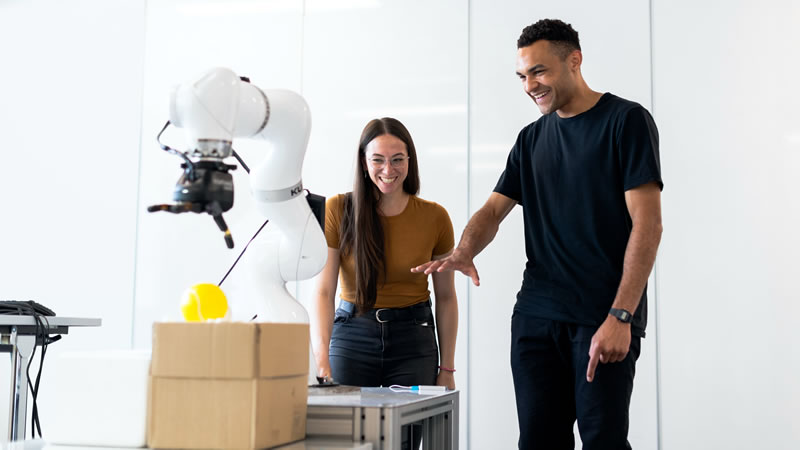How do robots in a collective know what the group as a whole is doing? How can connected devices make sense of the world around them with so many interconnections? How can a robotic arm composed of many independent parts understand how its body is behaving as it reaches for an object?
When intelligence is distributed across many parts, be they robots, devices, or objects, it can be tricky for the bigger picture to emerge. Yet answering these questions is key to making collective systems that are easy to design, monitor, and control.
EMERGE will deliver a new philosophical, mathematical, and technological framework to demonstrate, both theoretically and experimentally, how a collaborative awareness – a representation of shared existence, environment and goals – can arise from the interactions of elemental artificial entities.
In this effort, we will rely only on unstructured conditions that the real world demands without leveraging a pre-existing shared language between them. Our goal is to surpass the limitations and barriers of the current state-of-the-art distributed systems to produce breakthroughs and open new markets in the next generation of robotic systems. The impact areas include Internet-of-Things (IoT), smart cities, microservice-based information and communications technology (ICT) systems, and biomedical nanodevices.
The EMERGE consortium is composed of the University of Pisa (Italy), Ludwig Maximilian University of Munich (Germany), Delft University of Technology (Netherlands), University of Bristol (United Kingdom), and Da Vinci Labs (France).
EMERGE has been awarded a highly competitive grant in the Horizon Europe funding programme.
The project scored first among the 8 projects selected out of 34 projects submitted to the “Awareness inside” EIC Pathfinder Challenges 2021 call. The partners will receive a combined €2.8M grant from the European Commission over the next 4 years.
Collective Awareness

Humans and other biological agents can effectively move in new environments, navigate previously unseen situations, and intuitively cooperate through complex social interactions. From the moment they enter a room, two people charged with moving a table have at their disposal, through their senses, an abundance of information. They are aware of their own body, their surroundings, as well as of each other and the table. And, as soon as they are aware of their goal, with little to no explicit communication, they can integrate all this data – these individual, or local, awareness states – and cooperate to solve the problem and move the table to a new place.
Artificial intelligence nowadays enables the translation of isolated local awareness states from biological to artificial agents using information about the environment which can be collected from mechanical (contact, vibration, collision, etc), and electromagnetic (radio, infrared, visible light, etc) stimuli. However, the cooperation among those units is often dependent on some kind of central processing unit which collects that information and establishes a centralised awareness which distributes commands to each unit. Although useful, this process allows for very specific and previously programmed situations to be navigated and problems to be solved. For artificial beings to be able to act in the unstructured conditions that the real world demands, a new concept of collaborative awareness is needed.
EMERGE will investigate how simple agents can develop a representation of their mutual existence, environment, and cooperative behaviour towards the realization of tasks and goals. We build on a scenario of artificial beings with no shared language and constrained individual capabilities, which nevertheless leads to high-complexity behaviours at the collective level. Collaborative awareness becomes an emergent process supporting complex, distributed, and loosely coupled systems capable of high degrees of collaboration, self-regulation, and interoperability without pre-defined protocols.
Emergent Innovation

EMERGE will implement a clear research-to-technology pathway to surpass limitations and barriers of the current state-of-the-art multi-agent collaborative systems, with the potential to produce breakthroughs and open new markets in the next generation of robotic systems.
The Consortium will focus on three use cases. The first use case is modular soft robots – self‐assembling, repairing or replicating robots made from soft materials which offer higher freedom of movement, even in confined spaces, and better manipulation of delicate objects. In these robots, the body formed by a physically distributed collective needs to self-organise to account for the dynamic addition of components.
The second use-case are robotic swarms – groups with a large number of robots whose behaviour arises from the interactions between themselves and with their environment. This is an example of a large-scale minimal collective where agents need coordination to achieve a collaborative goal.
Finally, the third use case are collaborative robots, or cobots – robots interacting in direct contact with, or in close proximity to, humans. These represent a closer-to-market use case where interoperability is currently a significant barrier.
While robotics provides the perfect testing ground for this new framework, EMERGE also envisions impact in areas such as Internet-of-Things (IoT), smart cities and transportation, microservice-based information and communications technology (ICT) systems, and biomedical nanodevices, among others.
The EMERGE Consortium
The EMERGE approach is high-risk in that it tackles altogether the main limitations of existing frameworks of collective and distributed awareness. The approach is built on minimality and seeking complexity in simplicity, while attempting an integrative characterization of this novel concept from its cognitive and philosophical foundations to a mathematical and computational formalization, to the in-silico validation of the technology and ethical aspects.
For this reason EMERGE brings together such a unique blend of complementary competences and skills across key areas of the project: on philosophy of mind, ethics, and neuroscience (Ludwig Maximilian University of Munich, Germany); neural nonlinear dynamical systems, lifelong learning, distributed, and edge-AI (University of Pisa, Italy); nonlinear dynamical systems and control, computational neuroscience, soft and collaborative robotics (Delft University of Technology, Netherlands); collective awareness and intelligence, swarm robotics and minimal collectives (University of Bristol, United Kingdom); as well as innovation, exploitation, and communication of AI and robotics research (Da Vinci Labs, France).



